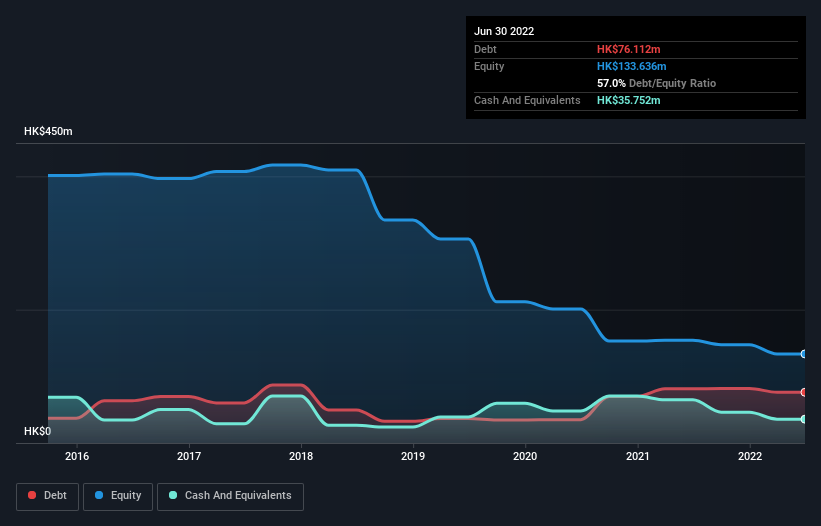- Hong Kong
- /
- Consumer Durables
- /
- SEHK:396
Would Hing Lee (HK) Holdings (HKG:396) Be Better Off With Less Debt?
Some say volatility, rather than debt, is the best way to think about risk as an investor, but Warren Buffett famously said that 'Volatility is far from synonymous with risk.' When we think about how risky a company is, we always like to look at its use of debt, since debt overload can lead to ruin. As with many other companies Hing Lee (HK) Holdings Limited (HKG:396) makes use of debt. But the more important question is: how much risk is that debt creating?
What Risk Does Debt Bring?
Debt and other liabilities become risky for a business when it cannot easily fulfill those obligations, either with free cash flow or by raising capital at an attractive price. Ultimately, if the company can't fulfill its legal obligations to repay debt, shareholders could walk away with nothing. However, a more usual (but still expensive) situation is where a company must dilute shareholders at a cheap share price simply to get debt under control. Having said that, the most common situation is where a company manages its debt reasonably well - and to its own advantage. The first step when considering a company's debt levels is to consider its cash and debt together.
View our latest analysis for Hing Lee (HK) Holdings
How Much Debt Does Hing Lee (HK) Holdings Carry?
The image below, which you can click on for greater detail, shows that Hing Lee (HK) Holdings had debt of HK$76.1m at the end of June 2022, a reduction from HK$81.2m over a year. However, it also had HK$35.8m in cash, and so its net debt is HK$40.4m.

How Healthy Is Hing Lee (HK) Holdings' Balance Sheet?
We can see from the most recent balance sheet that Hing Lee (HK) Holdings had liabilities of HK$114.7m falling due within a year, and liabilities of HK$7.47m due beyond that. Offsetting this, it had HK$35.8m in cash and HK$32.2m in receivables that were due within 12 months. So its liabilities total HK$54.2m more than the combination of its cash and short-term receivables.
While this might seem like a lot, it is not so bad since Hing Lee (HK) Holdings has a market capitalization of HK$97.0m, and so it could probably strengthen its balance sheet by raising capital if it needed to. But we definitely want to keep our eyes open to indications that its debt is bringing too much risk. There's no doubt that we learn most about debt from the balance sheet. But it is Hing Lee (HK) Holdings's earnings that will influence how the balance sheet holds up in the future. So when considering debt, it's definitely worth looking at the earnings trend. Click here for an interactive snapshot.
In the last year Hing Lee (HK) Holdings had a loss before interest and tax, and actually shrunk its revenue by 29%, to HK$145m. That makes us nervous, to say the least.
Caveat Emptor
While Hing Lee (HK) Holdings's falling revenue is about as heartwarming as a wet blanket, arguably its earnings before interest and tax (EBIT) loss is even less appealing. Indeed, it lost HK$3.8m at the EBIT level. When we look at that and recall the liabilities on its balance sheet, relative to cash, it seems unwise to us for the company to have any debt. Quite frankly we think the balance sheet is far from match-fit, although it could be improved with time. However, it doesn't help that it burned through HK$23m of cash over the last year. So suffice it to say we consider the stock very risky. When analysing debt levels, the balance sheet is the obvious place to start. But ultimately, every company can contain risks that exist outside of the balance sheet. For instance, we've identified 4 warning signs for Hing Lee (HK) Holdings (3 make us uncomfortable) you should be aware of.
At the end of the day, it's often better to focus on companies that are free from net debt. You can access our special list of such companies (all with a track record of profit growth). It's free.
Valuation is complex, but we're here to simplify it.
Discover if Hing Lee (HK) Holdings might be undervalued or overvalued with our detailed analysis, featuring fair value estimates, potential risks, dividends, insider trades, and its financial condition.
Access Free AnalysisHave feedback on this article? Concerned about the content? Get in touch with us directly. Alternatively, email editorial-team (at) simplywallst.com.
This article by Simply Wall St is general in nature. We provide commentary based on historical data and analyst forecasts only using an unbiased methodology and our articles are not intended to be financial advice. It does not constitute a recommendation to buy or sell any stock, and does not take account of your objectives, or your financial situation. We aim to bring you long-term focused analysis driven by fundamental data. Note that our analysis may not factor in the latest price-sensitive company announcements or qualitative material. Simply Wall St has no position in any stocks mentioned.
About SEHK:396
Hing Lee (HK) Holdings
An investment holding company, engages in the design, manufacture, marketing, sale, and export of home furniture products in the People's Republic of China, rest of Asia, Europe, and the United States.
Flawless balance sheet average dividend payer.
Market Insights
Community Narratives



